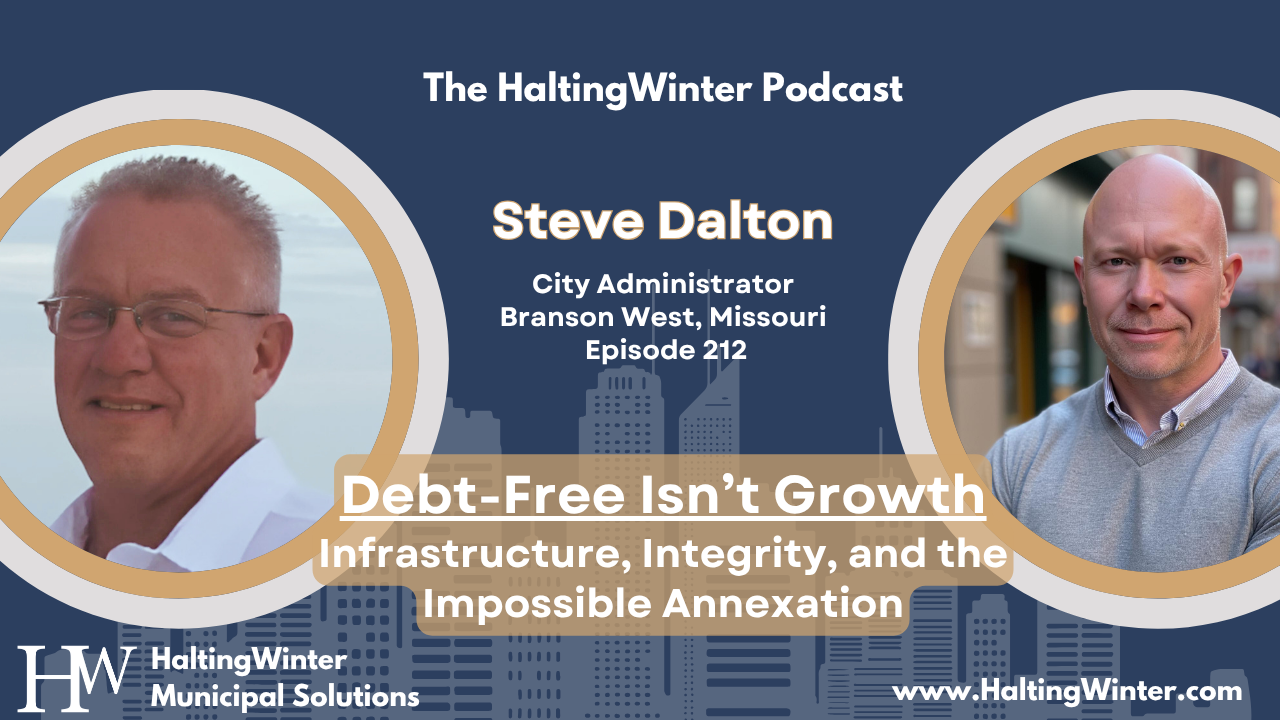Municipal Leaders: Develop Faster, Lead Stronger, Build Better

Every week, you’ll get insights and actionable steps to help you navigate personal growth and professional success.

Episode 221 of The HaltingWinter Podcast
Brought to you by Zencity
In local government, cities and counties share the same residents, the same challenges, and too often, a complicated relationship. Budgets, responsibilities, and political pressures can pull them apart, even when their success depends on working together.
This week on The HaltingWinter Podcast, we hear Ryan Pelletier’s story, a leader who’s been on both sides of the table. From managing a one-person town office to overseeing a sprawling county government, he’s navigated the unique demands, personalities, and politics that come with each role. His perspective is rare and exactly what’s needed to move from friction to collaboration.

Episode 220 of The HaltingWinter Podcast
Brought to you by Zencity
Some leaders choose public service. For others, it’s woven into who they are from the very beginning.
In our latest episode of The HaltingWinter Podcast, we share the story of a mayor whose journey began in the most unassuming way — as a neighborhood kid answering the call (literally) from the local mayor to help unclog storm drains, throw cinders on icy streets, and pitch in wherever he was needed.

You know what good leadership looks like. You’ve read the books, attended the workshops, and genuinely care about serving your community well. But when the pressure hits—budget crises, council conflicts, emergency situations—do you find yourself making decisions that don’t align with your stated values?
HaltingWinter Podcast, Episode 218
Featuring the story of Sugar Land, TX City Manager (and former Coral Springs, FL City Manager)

Michael Goodrum’s resume reads like a case study in climbing the municipal ladder.
Parks coordinator. Department head. Public works director. Assistant city manager.
But behind the impressive job titles was something few people saw:
A leadership approach that got results while quietly burning people out.

Episode 217 of The HaltingWinter Podcast
Brought to you by Zencity
In 2005, the City of Bowling Green, Kentucky, faced a moment that could have shattered public trust for a generation.
A senior leader had been embezzling public funds. The discovery fell into the lap of then City Treasurer Jeff Meisel, a lifelong Bowling Green resident, a CPA by training, and a man who had to decide whether to walk away from the mess or stay and lead through it.

Your last leadership team meeting ran two hours over schedule. Again. Despite having some of the most qualified department heads in the region, decisions still feel like negotiations. Staff can recite your mission statement but can’t explain how their daily work connects to it. And that customer service initiative you launched three months ago? Half your employees still default to the old way of doing things.
If this sounds familiar, you’re not alone—and you’re not failing.

Episode 215 of The HaltingWinter Podcast
Guest: Ed Barrett, Retired City Manager (Bangor & Lewiston, ME)
What does it actually take to lead a city through transformation?
Not the kind that fits neatly in a press release. The kind that spans decades. That outlives your tenure. That turns brownfields into riverwalks, empty buildings into museums, and overlooked communities into regional anchors.

Featuring Boone Bowling, Mayor of Middlesboro, KY
Episode 214 of The HaltingWinter Podcast
What do you do when you’re 22 years old, barely out of college, and have never been to a city council meeting but you love your town enough to fight for it?
If you’re Boone Bowling, you run for office.

Every week, municipal leaders across North America face the same frustrating reality: despite having compelling data, solid proposals, and genuine passion for community service, their most important messages fall flat.
Council members glaze over during budget presentations. Citizens disengage from critical infrastructure discussions. Staff meetings feel disconnected from the mission that brought everyone to public service in the first place. The harder you push facts and figures, the more resistance you encounter.
This isn’t a failure of logic. It’s a failure of connection.

Episode 212 of The HaltingWinter Podcast – Featuring Steve Dalton, City Administrator of Branson West, MO
Brought to you by Zencity
In 1990, Branson West, Missouri, had a population of 37. Today, it’s still technically a town of just over 500. But don’t let the numbers fool you—this place is built like a city ten times its size.